You’ve been told to meditate.
It will be good for you, they say.
It will help you quieten your monkey mind.
It will bring you peace and calm and make you all zen inside.
It will help you create more space in your life.
You will grow to love it.
All of that is true.
And then they say this:
All of your thoughts will disappear from your mind.
Say what?
This is when your bullshit antenna goes up.
You tried to meditate once or twice.
You sat in an awkward cross legged position on the floor.
You set your timer. You focussed on your breath. Closed your eyes. And waited….
Waited for the calm to wash over you, the monkeys to leave your brain and peace and calm to prevail.
And then this happened:
“God I’m so uncomfortable. Why do I have to sit on the floor to meditate, I’m not a freakin’ teenager. My knees hurt. Oh man I have so much work to do today, how am I ever going to get through it. My boss is such an ass. He has no idea what I deal with. I think he’s kind of a bully. And Sarah is driving me crazy. I must make sure I pick up pineapple and broccoli at the shops today. And coconut water. Oh and light bulbs. What else do I need? Must write a list. And a to do list for work as well. Must call Mum. And Nancy. And that guy who needs to fix the shower. Jesus is this meditation thing finished yet? I feel like I’ve been sitting here for an HOUR. I’m so done with this.”
Timer goes off. You’ve been sitting for an entire two minutes. And not one second of that two minutes did you have a mind void of rabid incessant monkeys.
Sound familiar?
Welcome to your meditation practice.
The number one myth that stops people from meditating is that as soon as you start, your mind will empty the 60-80,000 thoughts it has in any given day and you will be a clear vessel.
This is what we are told by well meaning people who are trying to help. But it doesn’t happen like that. And it’s not helpful.
Research was done with the most experienced meditators in the world. They were asked how long into their meditation practice are they aware of the first thought coming into their mind.
Brace yourself.
30 seconds.
30 SECONDS!
The most experienced meditators in the world.
So why on earth would we expect that a mere novice could sit to meditate and be clear and free of the monkey mind. Oh, and a novice is anyone who has been meditating for ten years or less, just so you know.
They call it a practice for a reason.
Your job in meditation practice is not to clear your mind of all thoughts. Your job is to show up, breathe, and when you notice that you have jumped on the thought train, to gently bring your attention back to your breath or your point of focus (mantra, music, guided visualisation, candle etc).
That’s it. That’s the practice in it’s most simple form.
And it’s worth persisting.
Meditation boosts our emotional intelligence. Brain-imaging research suggests that meditation can help strengthen your ability to regulate your emotions.
Meditation builds resilience. Multiple research studies have shown that meditation has the potential to decrease anxiety, and potentially boost resilience and performance under stress.
As reported in Harvard Business Review, research on creativity suggests that we come up with our greatest insights and biggest breakthroughs when we are in a more meditative and relaxed state of mind. It’s when we get our ‘aha’ moments perhaps because meditating encourages divergent thinking (i.e. coming up with the greatest number of possible solutions to a problem), a key component of creativity.
And if all of that isn’t enough to get you to practice, consider this: meditation has also been shown to increase empathy, improve focus and reduce distractions, improve relationships, boost your mood, improve your connections, enhance your wellbeing, lower your stress and make you kinder and more compassionate.
It’s kind of compelling right?
And if you’re worried that you don’t need yet another thing to add into your already jammed schedule, consider this advice that Arianna Huffington shared with Emma Seppala from Stanford University: “Although I’ve known its benefits since my teens, finding time for meditation was always a challenge because I was under the impression that I had to ‘do’ meditation. And I didn’t have time for another burdensome thing to ‘do.’ Fortunately, a friend pointed out one day that we don’t ‘do’ meditation; meditation ‘does’ us. That opened the door for me. The only thing to ‘do’ in meditation is nothing.”
Find five to ten minutes once a day, and start a practice. You don’t have to sit on the floor if you don’t want to, a chair will do just fine. You can use an app like Headspace or google guided meditations to find some online. Or use a simple timer app like Insight Timer (my personal favourite). Whatever supports you to build a practice that works is great. Make it a non-negotiable part of your day. And watch what happens.
Final note of advice: Please stop expecting a miracle to happen. Just give yourself the gift of showing up for yourself, taking your seat and finding your breath. And let go of any myths or expectations that stop you from doing that.
And then: Practice. With as much grace and ease as you can find.


